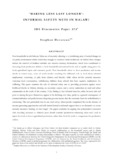| dc.contributor.author | Devereux, Stephen | |
| dc.coverage.spatial | Malawi | en |
| dc.date.accessioned | 2018-07-03T15:01:58Z | |
| dc.date.available | 2018-07-03T15:01:58Z | |
| dc.date.issued | 1999-01-25 | |
| dc.identifier.citation | Devereux, S. (1999) Making Less Last Longer: Informal Safety Nets in Malawi, IDS Discussion Paper 373, Brighton: IDS | en |
| dc.identifier.isbn | 1 85864 286 8 | |
| dc.identifier.uri | https://opendocs.ids.ac.uk/opendocs/handle/20.500.12413/13857 | |
| dc.description.abstract | Poor households in sub-Saharan Africa are of necessity adjusting to a bewildering array of radical changes in the policy environment within which they struggle to construct viable livelihoods.
In Malawi these changes include the removal of fertiliser subsidies and massive currency devaluations, which have contributed to increasing food production deficits at both household and national levels and to rapidly rising prices for food, agricultural inputs and consumer goods.
Poor households adjust to these production and income shocks in various ways, some of which involve searching for additional cash or food (from informal employment, borrowing, or gifts from relatives and friends), while others involve austerity measures (rationing food consumption, withdrawing children from school) that have negative implications for wellbeing.
This paper examines the role of informal safety nets in providing protection against recent livelihood shocks in Malawi, drawing on secondary sources and a survey undertaken in rural and urban communities in the south of the country.
A key finding is that informal transfers, either between rich and poor or among the poor themselves, appear to be declining over time, partly as a general consequence of commercialisation and partly because deepening poverty means that the economic basis for redistribution is contracting.
This was particularly true in our rural survey, where people complained that in the absence of income-generating opportunities and with limited formal or informal support there is no alternative to severe austerity measures: 'making less last longer'.
The paper concludes by arguing that policymakers concerned with providing assistance to Malawi's poor should consider 'productivity-enhancing safety nets', such as inputs-for-work to boost agricultural production, rather than food-for-work to compensate for production deficits. | en |
| dc.language.iso | en | en |
| dc.publisher | Institute of Development Studies | en |
| dc.relation.ispartofseries | IDS Discussion Paper;373 | |
| dc.rights.uri | http://www.ids.ac.uk/files/dmfile/IDSOpenDocsStandardTermsOfUse.pdf | en |
| dc.subject | Social Protection | en |
| dc.title | Making Less Last Longer: Informal Safety Nets in Malawi | en |
| dc.type | IDS Discussion Paper | en |
| dc.rights.holder | Institute of Development Studies | en |
| dc.identifier.team | Rural Futures | en |
| dcterms.dateAccepted | 1999-01-25 | |
| rioxxterms.funder | Default funder | en |
| rioxxterms.identifier.project | Default project | en |
| rioxxterms.version | VoR | en |
| rioxxterms.funder.project | 9ce4e4dc-26e9-4d78-96e9-15e4dcac0642 | en |

